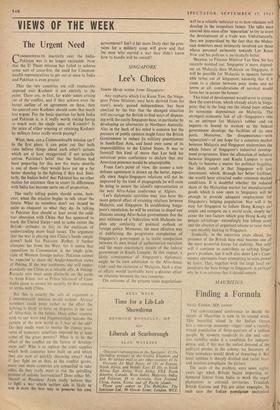VIEWS OF THE WEEK
The Urgent Need
OMMONWEALIII inactivity over the India-
Pakistan war is no longer excusable. Now that the U Thant mission has failed to achieve some sort of cease-fire, the need for Common- wealth representatives to get out at once to India and Pakistan is even greater.
That the two countries are still implacably opposed over Kashmir is not entirely to the point. There are, in fact, far wider issues arising out of the conflict, and if they achieve even the barest outline of an agreement on these, then the quarrel over Kashmir should seem that much less urgent. For the basic question for both India and Pakistan is, is it really worth risking losing 'o much over the single issue of Kashmir? Is the price of either winning or retaining Kashmir by military force really worth paying?
What, then, can a Commonwealth mission say? In the first place. it can point out that both sides believe things about each other's actions which are at least exaggerated, if not actually untrue. Pakistan's belief that the Indians had been preparing for this war for many months is one of them—they would have put up a far better showing in the fighting if they had. Simi- larly, the Indian belief that Pakistan has no other motive for existence than to assert its differences with India has become quite out of proportion.
The really telling points should come, how- ever, when the mission begins to talk about the future. What its members don't say should be quite as eloquent as what they do. In talking to Pakistan they should at least avoid the cold- war obsession with China that has appeared to mark the United States—and to some extent the British—attitudes so far, to the exclusion of understanding more local issues. The argument that the war is playing into China's hands simply doesn't hold for Pakistan. Rather, it further alienates her from the West, for it seems that opposition to Communism is the 'single prin- ciple of Western foreign policy. Pakistan cannot be expected to share the Anglo-American views of Peking. If the war continues, she will under- standably see China as a reliable ally. A Peking- Karachi axis must seem distinctly on the cards to Ayub Khan. just as Prince Sihanouk of Cam- bodia chose to ensure his security by first coming to terms with China.
But this is exactly the sort of argument a Commonwealth mission would eschew. African members could point rather to the effect the fighting is likely to have on disputes in the rest of Afro-Asia in the future. Does either country wish to see wars and fragmentation become the pattern of the new world as it was of the old? Do they really want to invoke the clumsy pres- sures of economic sanctions imposed by at least some of the great powers? What is to be the effect of the conflict on the future of develop- ment aid? Who is to replace the arms supplies which both countries have built up and which they are now so quickly throwing away? And if they fight on so that, as the conflict grows, more and more countries are compelled to take sides, do they really want to risk the spiralling process of outside intervention? Does either Mr. Shastri or President Ayub really believe that to fight a war which neither side is likely to win is even the best way to preserve his own government? Isn't it far more likely that the pres- sures for a military coup will grow and that the men who started a war they didn't know how to handle will be ousted?






























 Previous page
Previous page